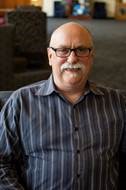Scholar Spotlight
Roger Heinrich

Media Arts Professor Roger Heinrich celebrated his 20th anniversary with MTSU last month. After a nearly three-decade career in commercial broadcasting, including owning a station and working for ABC Network, he joined MTSU in 2001. His specialty includes media management and media law and has also taught broadcast journalism.
His research focuses on the history of electronic media, sports and its impact on electronic media and broadcasting pioneers. He has been published in the Journal of Arizona History, Mandamorgen, American Journalism, Journalism History, Scientific Journals International, The Encyclopedia of the First Amendment and The Encyclopedia of the Fourth Amendment. He has received seven international awards, including an "Award of Excellence" and two "Awards of Distinction" from the Communicator Awards, for his creative work. In addition, he won a "Gold" Marcom Creative Award and the "Gold Hermes Creative Award" from the Association of Marketing and Communication Professionals.
He received a bachelor’s and master’s degree from Arizona State University and a Ph.D. from the University of Tennessee.
He spoke to Beverly Keel about his research, Walter Cronkite and his love of fishing.
This year marks your 20th anniversary at MTSU. How have things changed since you started? What do you miss most about “the old days?”
The physical aspect of the campus has changed so much in my 20 years here. The Bragg Building was one of the eastern most buildings in 2001. With all the new structures built and under construction, it’s nearly in the center of campus now. I miss the people, of course, those who have retired and those who have passed on. But new colleagues bring new ideas and a vibrancy that is infectious.
You were hired to teach broadcast journalism but now teach management, sales, advertising and media law. Tell us about that evolution.
The switch from teaching broadcast journalism to media management was seamless. I had been teaching the media management class already and had taught an advertising class as a graduate associate at the University of Tennessee. My 26 years in broadcasting also helped. I sold advertising, wrote lots of commercial copy and managed stations in the western United States. At one time my brother and I were owners of a station. Media Law was one of my related fields of study in both my master’s and Ph.D. programs. It took a couple of retirements, but when a chance to finally teach it made itself available, I pounced!
One of your areas of research has been the history of media, including a journal article on the media coverage of the Spanish Flu Pandemic. How does that compare to the media today?
I published a paper on my research of the Spanish Flu Pandemic years before I ever thought I’d be in the middle of another pandemic with everyone else on the planet! A comparison in media coverage of the two is like comparing night to day. Newspapers were the main source about the first; everyone is (or thinks they are) a source for the second!
Tell us a little about your research into the relationship between sports and media, particularly how it relates to gender.
I was invited by Dr. Thomas Horky of the Macromedia University of Applied Science in Hamburg, Germany and Dr. Jorg-Uwe Nieland of the Institute for Communications and Media Research in Cologne, Germany, to join them in a study of how media reports on women’s sports and women athletes. In a sentence, we found that media sorely neglects both. We replicated the study a number of years later and found that not much had improved.
Which media pioneer has inspired you most and why?
My parents watched Walter Cronkite every evening. Since we only had one television, I watched him too! To be “the most trusted man in America” must have been a heavy burden to bear. I had the opportunity to meet him and speak with him while studying at Arizona State University. The exchange we had increased my admiration for him.
You are one of the College’s professors who teaches Honors sections of our courses. What do you like about teaching those classes?
The smaller class sizes are what attract me to the Honors College. So much more time can be spent on class discussion and class projects
As vice-chair of the Murfreesboro Cable Commission, what do you do?
I’ve served on the commission for the past 5-years and have been vice chair for a year. The Cable Television Commission is responsible for helping cable customers in resolving cable television issues with Comcast Xfinity, making recommendations to the City Council regarding cable television issues, operation of the government access channel (CityTV), overseeing and enforcing the Cable Communications Ordinance and the local cable television franchise agreement. The commission has no control over cable television operators channel line ups and no longer has any control over cable television rate regulation.
What have been your go-tos during the pandemic? Have you binge-watched anything?
I’m not much of a binge watcher. It can take me months to finish a Netflix series. However, I admit that I rolled through Breaking Bad for a second time in record time! I had forgotten what an excellent production it was.
What do you do when you aren’t working?
I enjoy the great outdoors. I especially like to fish. Thank goodness there is a grocery store across the street from my house. My fishing ability is incredible, my catching ability not so much.
What advice do you have for us on improving our productivity, carving our uninterrupted hours for research? Any life hacks you can share?
There has to be a balance between teaching load and time for research. I think MTSU does a good job overall maintaining that balance.


